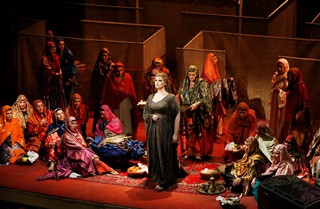|
Back
Reviving a rarity Pesaro
Teatro Rossini
08/12/2014 - & August 15, 18, 22, 2014
Gioachino Rossini: Aureliano in Palmira
Michael Spyres (Aureliano), Jessica Pratt (Zenobia), Lena Belkina (Arsace), Raffaella Lupinacci (Publia), Dempsey Rivera (Oraspe), Sergio Vitale (Licinio), Dimitri Pkhaladze (Gran Sacerdote), Raffaele Constantini (Un Pastore).
Orchestra Sinfonica G. Rossini, Will Crutchfield (Conductor), Chorus of the Teatro Comunale di Bologna, Andrea Faidutti (Chorus Master), Lucy Tucker Yates (Pianoforte continuo), David Ethève (Cello continuo)
Mario Martone (Director), Sergio Tramonti (Settings), Ursula Patzak (Costumes)

J. Pratt (Courtesy of R.O.F.)
Aureliano in Palmira, this most serious of Opera seria, was arguably written in a style already old-fashioned when Rossini and Romani first collaborated on it. Drawn from older sources, the libretto offers little by way of action and many of the musical numbers are commentary upon off-stage events or declarations of actions yet to occur. Together, these present the modern audience with a theatrical piece which is static and lacks dramatic impact.
Editor of this critical edition as well as conductor of these Rossini Opera Festival (R.O.F.) performances, Will Crutchfield comments in his programme notes that the opera is something of a misunderstood gem which Rossini himself chose not to discard but to quote extensively in subsequent operas. He speaks of “...the verses...(which) are fresh, direct and personal, and the music belongs clearly in the Romantic line that leads Rossini from Tancredi through La donna del lago to Guillaume Tell.”
Stage Director Mario Martone has done little to relieve the reactionary nature of the opera. Characters and chorus appear and re-appear offering commentary upon the battles, escapes, insurgencies and the mayhem of war but we see little of events which provoke the on-stage drama. Rossini’s much employed chorus are frequently brought on-stage to remain static in a setting which is sometimes packed tightly onto the limited space of the Teatro Rossini stage.
Scenic Designer Sergio Tramonti has constructed a labyrinth of translucent screens among which characters meander. The meaning of this was unclear but it does suggest the political manoeuvrings of the two protagonists, each trying to achieve glory and heroic status. At times, the screens are lit to reveal elements within. Most surprising is the presence on-stage of the pianoforte and cello continuo who are not costumed but interact with and assist the characters throughout the opera. Their presence gives a surreal aspect to the visuals of the production which is not fully integrated and leaves more questions than answers.
Costume Designer Ursula Patzak has created a colourful world of oriental exoticisms. Arsace and the warriors are darkly clad in leather and rough homespun in contrast to the armoured Romans who dominate all attempts to breed insurgency. The women of Zenobia’s court are brightly hued; swirling lengthy head-dresses and carrying rich gifts of wines, jewels and carpets trying to tempt Aureliano away from his determinedly Roman stoicism. The Romans and their women are sophisticated urbanites in comparison to the tribal appearance of Zenobia’s subjects.
In this opera, Rossini has included a huge amount of work for the chorus. The Coro del Teatro Comunale di Bologna gave a solid and totally reliable performance with sharp diction and tempi. The Orchestra Sinfonica G. Rossini gave a superb rendition of the score although Maestro Crutchfield tended at times to take the tempi at an academic pace when a more lively reading would have added to the impact of the opera.
As Aureliano, American Tenor Michael Spyres gave an entirely believable and well-received performance. His voice is powerful and multi-hued, ranging from the richness of his chest notes to the ringing clarity of his upper register. In character as the conquering emperor, he was well cast. His presence was always confident and masterful yet allowed him to soften towards the dilemma of his captives and finally yield to the pleas of Publia for clemency. His was a well-wrought character with reflected the depth of the portrait Rossini painted.
Australian Soprano Jessica Pratt has appeared at two previous festivals in major roles and in recital. She is a magnetic presence on stage. Moving confidently as the vanquished queen Zenobia, she adopted a tone of imperious detachment to the Roman war machine and exuded an air of majesty as well as dangerousness. Her character ranges the full gamut of emotions – from powerful world leader to emotionally drained lover and Ms Pratt captured eloquently these many moods. Her singing was of the finest quality. Her instrument is dark and honeyed at the lower end and brilliantly powerful and clear in the upper register. This role requires immense stamina and Ms Pratt gave a completely mesmerizing performance.
Mezzosoprano Lena Belkina from Uzbekistan makes her R.O.F. debut in the trouser role of Arsace. She has a fine voice with many shades of tone and delivered the role well. Her acting was static as was much of the action of the opera and this made it somewhat difficult to empathise with Arsace’s love-driven lust for battle, especially in the scenes where he directly confronts the imperious Aureliano.
Overall, this production is impressive for a number of reasons but chiefly for the fact that R.O.F. have lived true to their mandate to revive all the works of the composer including this hugely difficult piece to re-energize for a modern audience. The production is visually attractive, aurally rewarding (particularly to hear the early forms of music the maestro would reuse in later operas) and in this new edition, complete thanks to the work of Maestro Crutchfield. Nevertheless, it is a huge and academically demanding piece.
Gregory Pritchard
|